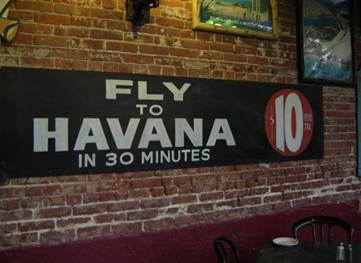The Cuba Embargo Has Actually Worked Like a Charm
The Cuba Embargo Has Actually Worked Like a Charm | TheBlaze.com
Humberto Fontova
First item on the anti-embargo teleprompter: “But the embargo hasn’t worked. After half a century the Castro regime still stands. So why should we continue this failed policy?’
It’s almost too easy when a glaringly false premise kicks-off a debate. But here we go: Who–besides the Castro lobby–ever claimed “regime-change” was the embargo’s rationale? Has anyone (besides this writer) bothered to research this?…..Okay, here:
On January, 21, 1962 at Punta del Este Uruguay U.S. Secretary of State Dean Rusk gave a speech to the Organization of American States recommending the members join the U.S. in voting for an economic embargo of Cuba. In this speech there is not a single word–or even an inference–that regime-change was the embargo’s goal. “The United States objects to Cuba’s activities and policies in the international arena not its internal system or arrangements.”
INDEED , Secretary Rusk went out of his way to stress that regime-change was NOT the embargo’s goal.
In brief, the U.S. was trying to contain Soviet-Cuban sponsored international terrorism:
“I’m proud of the path of Osama bin Laden,” snickered Ilich Ramírez Sánchez from a French prison in 2002. Ramirez is also known as “Carlos the Jackal,” and was also known in the 1970s as “The World’s Most Wanted Terrorist.” “Bin Laden has followed a trail I myself blazed,” he CONTINUED in an interview from a French prison with the pan-Arab daily Al-Hayat. “I followed news of the September 11 attacks on the United States non-stop from the beginning. I can’t describe that wonderful feeling of relief.”
In 1960 Ramirez was an eager recruit into Cuba’s “guerrilla” (terror) TRAINING camps started by Che Guevara in 1959. Everyone from America’s Black Liberation Army to Puerto Rico’sMacheteros, to South Yemen’s NLF, to Argentina’s Montoneros, to Colombia’s FARC, to Namibia’s SWAPO, to the Black Panthers, to the PLO, to Western Sahara’s Polisaro to THE IRA received training and funding from Castro.
GRANTED , while most were not immediately defeated they were certainly contained. Then for three decades the Soviet Union was forced to pump the equivalent of almost ten Marshall Plans into Cuba. This cannot have helped the Soviet Union’s precarious solvency or lengthened her life span.
Second item on the anti-embargo teleprompter: “But the Cold War’s over, for heaven’s sake! Why then CONTINUE this relic of that era?”
Because international terrorism still rages with slightly different sponsors and Castro’s Cuba is still prominent among them. A DEA report attributes half of the world’s cocaine supply to Columbia’s FARC (Fuerzas Armadas Revolucionarias de Colombia,) the largest, oldest and most murderous terrorist group in our hemisphere whose murder toll dwarfs that of Al Qaeda and ISIS combinedand includes some murdered U.S. citizens. This same group thanks Fidel Castro for their immense FAME AND FORTUNE . “Thanks to Fidel Castro” boasted late FARC commander Tiro-Fijo in a 2002 interview, “we are now a powerful army, not a hit and run band.”
But let’s forward a bit even from there: A report from Colombia’s military intelligence DAS (Departamento Administrativo de Seguridad) obtained by the Colombian paper, El Espectador two years ago revealed that the FARC maintains a major office in Havana. The report also described a recent visit by FARC officers Hermes Aguilera and Olga Marín to Cuba for some brainstorming with Castro’s DGI. The report mentions that this same Olga Marin “receives a $5,000 monthly stipend through the Cuban BANK account of a Venezuelan government office.”
Furthermore, last summer Cuba was caught trying to smuggle military contraband though the Panama Canal to North Korea, in what the UN SECURITY Council itself denounced as the worst violation of the arms embargo against North Korea to date. The arms embargo was imposed in 2006 by the very United Nations.
Third item on the anti-embargo teleprompter: “But the embargo mainly punishes the Cuban people, and gives Castro an excuse for his economic failures and human rights violations.”
Well, why not ask the Cuban people themselves how they feel about it? GRANTED , polls are difficult to conduct in a Stalinist nation but every atom of observable evidence proves that the Cuban people actually want the embargo tightened.
For full article click the link above.



